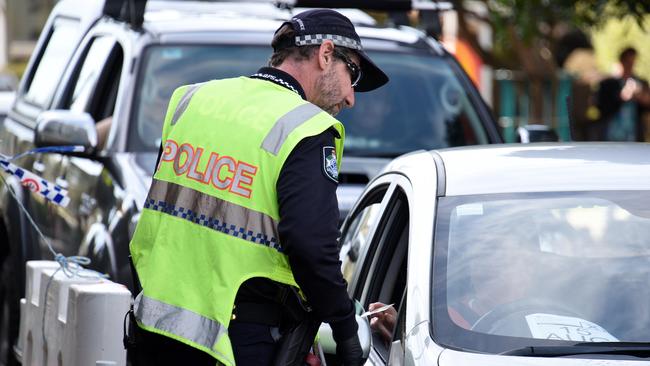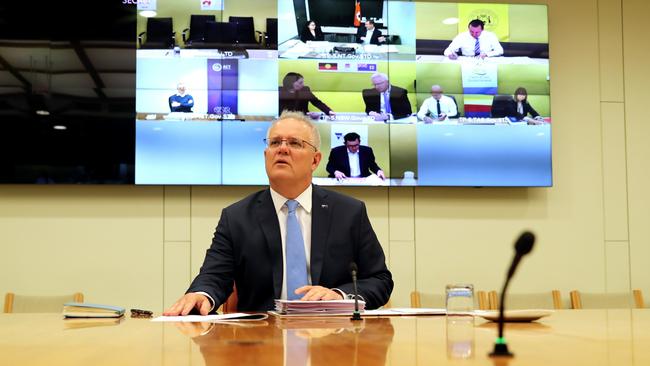Leaders spruik their delusion to the nation
Politicians have done more damage than the coronavirus and shown a cynical and callous approach to state borders.

Nowadays the paperwork would kill the fun.
State borders have seldom meant much in this country, outside of footy contests — perhaps a speed limit change or dumping some oranges to guard against fruit flies. Border communities on that SA/Victoria border, along the Murray between Victoria and NSW and in the Tweed Heads/Coolangatta region of NSW and Queensland have always been integrated — people flitting across border lines for school, sport, work and medical treatment.
Our state boundaries have always seemed rather twee compared to borders I have visited overseas: the demilitarised zone between the Koreas; the Green Mile dividing Nicosia in Cyprus; or the Berlin Wall back in the day. Yet now we have checkpoints, police patrols and drones in the sky.
Nothing better demonstrates the lack of imagination, cowardly countenance or political cynicism of our media/political class than what they have done to our borders. Tragically, and callously, premiers have turned state borders into impervious barriers. None of us could have imagined this a year ago and it has happened all too easily, without national co-ordination or local consultation. It has turned Australian against Australian, split families and seen Victorians treated like the undead. The four smallest states and two territories are now virtually COVID-19 free. They want the citizens of Victoria and NSW to stay away — so long as they keep sending the disproportionate share of tax revenue they funnel via Canberra.
This self-interest and division are not how our federation was supposed to work. This is what federation was supposed to avoid.
Parents of a newborn boy were forced to stay in northern NSW while their baby was treated in a Brisbane hospital; a midwifery student in Western Victoria cannot return to SA to complete her studies; and a school at Apsley, Victoria, has lost nine of its 26 students and five of its seven teachers because they live on the SA side of the border. Families are forced apart and services disrupted.
When SA Liberal Premier Steven Marshall or WA Labor Premier Mark McGowan boast about keeping the virus at bay, they fund their COVID-free zones through federal schemes and taxes paid in the other states. When Queensland Labor Premier Annastacia Palaszczuk says her hospitals are for Queenslanders alone, she ignores the funding arrangements, the reciprocal rights her citizens enjoy, and the heartache she has inflicted. As predicted the day it led the way on closing borders, Tasmania reacted to its first coronavirus outbreak by asking for federal help. Sure enough, it had to give exemptions to its own border bans so Australian Defence Force personnel could fly in and help.
The states, with the notable exception of NSW, have been utterly selfish, signing up to federal schemes that benefit them but ignoring a national strategy when there might be a price to pay. Scott Morrison’s national cabinet was an optimistic show of faith in federalism but in practice it has exposed the flaws of our federal system and the impotence of the national government.
The Prime Minister’s plan for a sensible “flatten the curve” approach, preference for kids to attend school and urgings to keep state borders open have been rebuffed for months by all but NSW. Victoria has failed comprehensively — shambolic quarantine, tardy contact tracing, absurdly lax isolation rules for infected people and a patronising, authoritarian approach that has failed to convey the right messages about personal behaviour.

NSW mucked up the Ruby Princess but, since then, has led the way by carrying the bulk of the quarantine burden, isolating outbreaks, vigilantly tracing contacts, testing assiduously, and sharing information about outbreaks in a mature and co-operative fashion. Other states have done little but keep their borders closed.
Despite Victoria’s woes, Australia’s health outcomes are enviable by world standards. We lost twice as many people from the flu last year than we have lost so far from the pandemic, and overall deaths in Victoria last month were down 500 on July 2019 — this puts the impact of the pandemic into perspective. About three quarters of Victoria’s deaths have occurred in aged-care facilities, so targeted protections in the aged-care sector could have been more effective and saved more lives than the blunt instruments that tried to prevent community transmission but failed. Yet Andrews blames his citizens for the failings.
Melburnians can’t stray more than 5km from home, leave their houses at night or spend more than an hour in the park each day. This approach invites other states to ban Victorians; overbearing authoritarianism and nanny state rules are as contagious as the virus.
We have reached a cringe-worthy point in our national life where state premiers hold daily press conferences to announce no new infections. They are indulging in a sickening political ritual of disaster posturing.
Some are closer to elections than others, but all are alive to how the crisis improves their standing, as they bask in the reflected credibility of chief medical officers. They surrender decision-making to medical advice, ignoring the need to balance social and economic factors over a medium-term outlook.
The premiers conjure new restrictions to give themselves something to announce, fuel fears about a disease that is unthreatening to most of the population and encourage reliance on government for solutions. We are seeing a national retreat from personal responsibility.
Look around your workplace; all those stickers about where to walk, where to queue, which choke points to avoid and how many people are allowed in the lifts. The economic and social damage from this public health crisis have been magnified by the rise of the risk management and human resources departments.
Our politicians appeal to the worry warts and hypochondriacs, spread fear about a “deadly” virus and pretend we are all at risk. There is blatant deceit as they seize on rare deaths of people under 50, refuse to disclose their comorbidities, and use them to frighten young people. Whatever happened to “Keep calm and carry on?”
Politicians should be honest about how young people have little to fear but should exercise social distancing and good hygiene to prevent spreading the disease. Instead, they mobilise drones and helicopters patrols to keep citizens out of the local park or on the right side of borders.
SA is preparing to allow foreign students back but won’t accept Victorian students even if they undertake two weeks of isolation. Politicians eschew common sense and the management of acceptable risks.
The federal government is not immune. Australians are banned from overseas travel and international arrivals are shunned, yet there is no logical argument against inbound or outbound travel subject to self-funded quarantine and COVID-19 testing.
Qantas has just tossed 6000 people out of work and hospitality businesses around the nation are comatose, yet our state and federal governments are doing all they can to stop mobility. This is an inversion of their duty.
Our media, dominated by publicly funded progressives, is part of the problem. The journalists who rail against new powers to combat terrorism heartily endorse measures that lock families at home, keep workers from their jobs or force small businesses to shut down indefinitely.
Morrison needs to reassert authority. We need politicians who will square with the public about how we manage this virus and its impacts, not pretend we can defeat it. Empowering more bureaucrats to organise exceptions to existing border bans is a Band-Aid approach.
Our media/political class has eviscerated a self-reliant, robust, anti-authoritarian, and egalitarian country. Our politicians have done far more damage than the coronavirus.
They hold out the unlikely hope of an imminent, effective vaccine. They do not have a clear plan beyond the next grim press conference.
Outside war, we have never suffered so much government. But there is little leadership. We are bordering on delusion.




My great-uncle’s farm was just into Victoria, northeast of Mount Gambier, and backed on to the South Australian border. As kids, we would climb back and forth through the fence: “I’m in South Australia, now I’m in Victoria.”